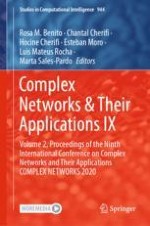2021 | OriginalPaper | Buchkapitel
Local Degree Asymmetry for Preferential Attachment Model
verfasst von : Sergei Sidorov, Sergei Mironov, Igor Malinskii, Dmitry Kadomtsev
Erschienen in: Complex Networks & Their Applications IX
Aktivieren Sie unsere intelligente Suche, um passende Fachinhalte oder Patente zu finden.
Wählen Sie Textabschnitte aus um mit Künstlicher Intelligenz passenden Patente zu finden. powered by
Markieren Sie Textabschnitte, um KI-gestützt weitere passende Inhalte zu finden. powered by
